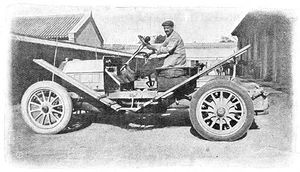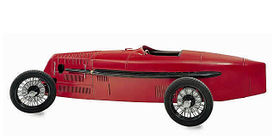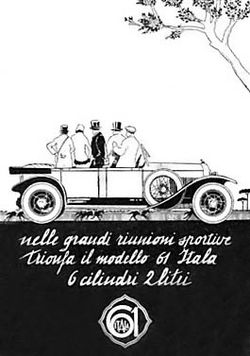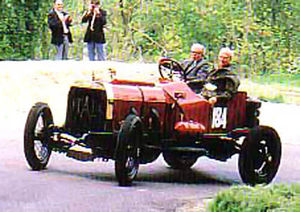Difference between revisions of "Itala"
m |
m |
||
| (12 intermediate revisions by the same user not shown) | |||
| Line 1: | Line 1: | ||
| − | [[Image: | + | [[Image:Itala_logo2 copy.png|center|160px]] |
{{X}} | {{X}} | ||
| Line 29: | Line 29: | ||
|Displacement || 7433 cc | |Displacement || 7433 cc | ||
|- | |- | ||
| − | |Power || 45 hp at 1250 rpm | + | |Power || 45 hp at 1250 rpm |
|- | |- | ||
|Speed || 95 mph | |Speed || 95 mph | ||
| Line 38: | Line 38: | ||
This historic car that in 1907, with the crew made up of Prince [[Scipione Borghese]], mechanic [[Ettore Guizzardi]] and [[Luigi Barzini]], special correspondent of ''Corriere della Sera'', won the 60 day race from Beijing to Paris, sponsored by the French daily ''Le Matin''. The [[Italian]] car preceded the closest opponent by 20 days, after overcoming natural pitfalls and obstacles of all kinds, scattered across the 16,000 km (9,941.96 miles) route. With two huge side tanks for gasoline attached to the car especially for the race the '''Itala''' (later called Beijing - Paris) was driven by an over 7-liter engine with a 4 speed [[gearbox]]. | This historic car that in 1907, with the crew made up of Prince [[Scipione Borghese]], mechanic [[Ettore Guizzardi]] and [[Luigi Barzini]], special correspondent of ''Corriere della Sera'', won the 60 day race from Beijing to Paris, sponsored by the French daily ''Le Matin''. The [[Italian]] car preceded the closest opponent by 20 days, after overcoming natural pitfalls and obstacles of all kinds, scattered across the 16,000 km (9,941.96 miles) route. With two huge side tanks for gasoline attached to the car especially for the race the '''Itala''' (later called Beijing - Paris) was driven by an over 7-liter engine with a 4 speed [[gearbox]]. | ||
| + | The four-cylinder Itala was produced from 1907 to 1915 at the [[Turin]] plant (between Corso Orbassano-Modane train, Racconigi course, during the Paris and Milan-Turin rail) from the joint-stock company Italy - Turin car factory, founded by Matteo Ceirano. It has a four-cylinder engine biblocco vertical, displacement of 7,433 cc of power but with only 45 hp at 1,250 rpm. He driveline as most cars produced by Italy and four-speed gearbox and reverse. The maximum speed not exceeding 95 km per hour. | ||
| + | |||
| + | The magnet power is low voltage. The starter is crank, lights, kerosene lanterns for the location and number plate and acetylene for the big lights. It has no front brakes or electrical system. Among other car company in Turin that are distinguished by many racing victories at the time, it goes down in history to have won the raid in 1907 Peking to Paris, or to have covered 16,000 km in 44 days. | ||
| + | |||
| + | The 35/45 hp Itala of Prince Scipione Borghese, assisted by mechanical Hector Guizzardi and journalist Luigi Barzini, Special Envoy of the 4-cylinder Itala car which won the Peking to Paris in 1907. Documentation Centre of the Automobile Museum, Turin [pdf] Daily Telegraph and the Corriere della Sera, in fact, part of Beijing June 10, 1907 to arrive in Paris on August 10. It is an historic day for Italian motor racing and the car that has character, discovered by Charles Biscaretti of Ruffia in the twenties, is now housed in the Museum of Turin. An Italy 35/45 hp also belongs to Queen Margherita of Savoy, which is used to call "Palombella. It is a vehicle finished with great refinement is a Landaulet with the front seats covered by the car roof and no doors, the back can be opened and seats and upholstery are covered with a braid worked in gray cloth, the sides are padded and quilted handles and reproduced the eagle Savoy. The price of the chassis alone is estimated between 18,000 and 17,500 pounds in 1908 of 1909-1910. | ||
| + | |||
| + | |||
| + | == ITALA Mod. 11 == | ||
| + | {| border=1 cellspacing=3 cellpadding=4 style="float:right; margin:0 0 .5em 1em; width:280px; background:#505050; border-collapse:collapse; border:1px solid #999; font-size:83%; line-height:1.5; " summary="Infobox Automobile" | ||
| + | |- style="text-align:center; background:#505050;" | ||
| + | | colspan=2 style="padding:0; background:#505050; color:#fff; border-bottom:1px solid #999;" |[[Image:itala_11_1925.jpg|280px]] | ||
| + | |- style="color:#fff; background:darkred; font-size:larger;" | ||
| + | ! colspan=2 |'''1925 Itala 11''' | ||
| + | |- | ||
| + | |Engine || V12 cylinders | ||
| + | |- | ||
| + | |Displacement || 1050 cc | ||
| + | |- | ||
| + | |Power || 60 Hp at 7000 rpm | ||
| + | |- | ||
| + | |Speed || 150 km/h | ||
| + | |- | ||
| + | |Source || [http://www.museoauto.it National Italian Automobile Museum] | ||
| + | |} | ||
| + | |||
| + | Designed by [[Giulio Cesare Cappa]], this small racing car made its debut in 1925 and was one of the first single-seaters. Its leading-edge specifications included a just over 1-litre, V12 engine with Roots positive-displacement supercharger, all-independent suspension, reinforced wooden chassis and integral engine, transmission and differential. A 1500 cc version known as the 15 was also designed. | ||
| + | {{-}} | ||
| + | |||
| + | |||
| + | [[File:1907 Itala 35-45 HP Peking-Paris.jpg|thumb|right|300px|'''1907 Itala 35-45 HP Peking-Paris''' [http://www.ritzsite.nl/ <small>Source</small>]]] | ||
[[File:1924 Italia Tipo 61 6 Cylinder advertisement.jpg|thumb|right|250px|'''1924 Italia Tipo 61 6 Cylinder advertisement''']] | [[File:1924 Italia Tipo 61 6 Cylinder advertisement.jpg|thumb|right|250px|'''1924 Italia Tipo 61 6 Cylinder advertisement''']] | ||
[[Image:25_Italia_Mdl_61_by_Garavini.jpg|thumb|left|300px|'''Itala Model 61 by [[Garavini]]''' <br>[http://www.oldcarandtruckpictures.com <Small>Source</small>] ]] | [[Image:25_Italia_Mdl_61_by_Garavini.jpg|thumb|left|300px|'''Itala Model 61 by [[Garavini]]''' <br>[http://www.oldcarandtruckpictures.com <Small>Source</small>] ]] | ||
[[Image:1908 ITALA 12.9 Litre.jpg|thumb|300px|left|'''1908 Itala 12.9 Litre''']] | [[Image:1908 ITALA 12.9 Litre.jpg|thumb|300px|left|'''1908 Itala 12.9 Litre''']] | ||
| + | [[Image:25_Italia_Mdl_61_Garavini.jpg|thumb|300px|left|'''1925 Itala Tipo 61 bodied by [[Garavini]]''']] | ||
| − | + | <gallery> | |
| + | File:1923 Itala 51S.jpg|'''1923 Itala 51S''' | ||
| + | File:1923 Itala 51S 2.jpg|'''1923 Itala 51S''' | ||
| + | File:1923 Itala 56A.jpg|'''1923 Itala 56A''' | ||
| + | File:1923 Itala 56A 2.jpg|'''1923 Itala 56A''' | ||
| + | </gallery>[http://www.ritzsite.nl/ <small>Source</small>] | ||
| − | |||
| − | + | {{-}} | |
| + | Send what you have to: | ||
| + | *[mailto:Info@WheelsofItaly.com '''info@wheelsofitaly.com'''] | ||
| − | |||
{{-}} | {{-}} | ||
{{A-Z multipage list|Car Information and Photos by Marque|Information and Photos by Marque|}} | {{A-Z multipage list|Car Information and Photos by Marque|Information and Photos by Marque|}} | ||
{{A-Z multipage list|Motorcycle Information and Photos by Marque|Motorcycle Information and Photos by Marque|}} | {{A-Z multipage list|Motorcycle Information and Photos by Marque|Motorcycle Information and Photos by Marque|}} | ||
| + | <br> | ||
{{Car Information and Photos by Marque}} | {{Car Information and Photos by Marque}} | ||
{{Motorcycle Information and Photos by Marque}} | {{Motorcycle Information and Photos by Marque}} | ||
| + | |||
| + | |||
| + | [[Category:Car manufacturers of Italy]] | ||
| + | [[Category: Cars]] | ||
Latest revision as of 08:55, 18 November 2011
1904 - 1934

Itala was an exotic car manufacturer based in Turin, Italy from 1904-1934, started by Matteo Ceirano and five partners in 1903.
Three cars were offered in the first year, an 18hp, a 24hp and a 50hp. In 1905 they started making very large engined racing cars with a 14.8 Litre 5 cylinder model which won the Coppa Florio and the year after that the Targa Florio. In 1907 a 7433 cc 35/45hp model driven by Count Scipione Borghese won the Peking to Paris motor race by three weeks. These sporting successes helped sales dramatically, the company continued to grow. The company experimented with a range of novel engines such as variable stroke, sleeve valve, and "Avalve" rotary types and at the beginning of WW1, offered a wide range of cars. During the war Itala built aeroplane engines but made a loss producing them.
After the armistice car production resumed with models based on the pre war cars such as the Tipo 50 25/35hp and a re-appearance of the Avalve in the 4426 cc Tipo 55 but financial success eluded the company
From 1924 the company was being run under receivership and they appointed Giulio Cesare Cappa from Fiat as general manager. He produced a new car, the Tipo 61 with 7 cylinder alloy engine which was well received but he then decided to return to motor sport producing the Tipo 11 a very advanced car with front wheel drive, V-12 supercharged engine and all round independent suspension but the car never raced. Two Tipo 61s did take part in the 1928 Le Mans 24 hour race winning the 2 litre class.
The company was bought by truck maker Officine Metallurgiche di Tortona in 1929 and a few more cars were made up to 1935. The remains of the company was sold to Fiat.
Itala 35/45 HP (Beijing - Paris) 1907
| 1907 Itala 35-45 HP Pechino Parig | |
| 1907 Itala 35-45 HP Pechino Parig | |
|---|---|
| Engine | 4 cylinders |
| Displacement | 7433 cc |
| Power | 45 hp at 1250 rpm |
| Speed | 95 mph |
| Weight | 1370 kg |
This historic car that in 1907, with the crew made up of Prince Scipione Borghese, mechanic Ettore Guizzardi and Luigi Barzini, special correspondent of Corriere della Sera, won the 60 day race from Beijing to Paris, sponsored by the French daily Le Matin. The Italian car preceded the closest opponent by 20 days, after overcoming natural pitfalls and obstacles of all kinds, scattered across the 16,000 km (9,941.96 miles) route. With two huge side tanks for gasoline attached to the car especially for the race the Itala (later called Beijing - Paris) was driven by an over 7-liter engine with a 4 speed gearbox.
The four-cylinder Itala was produced from 1907 to 1915 at the Turin plant (between Corso Orbassano-Modane train, Racconigi course, during the Paris and Milan-Turin rail) from the joint-stock company Italy - Turin car factory, founded by Matteo Ceirano. It has a four-cylinder engine biblocco vertical, displacement of 7,433 cc of power but with only 45 hp at 1,250 rpm. He driveline as most cars produced by Italy and four-speed gearbox and reverse. The maximum speed not exceeding 95 km per hour.
The magnet power is low voltage. The starter is crank, lights, kerosene lanterns for the location and number plate and acetylene for the big lights. It has no front brakes or electrical system. Among other car company in Turin that are distinguished by many racing victories at the time, it goes down in history to have won the raid in 1907 Peking to Paris, or to have covered 16,000 km in 44 days.
The 35/45 hp Itala of Prince Scipione Borghese, assisted by mechanical Hector Guizzardi and journalist Luigi Barzini, Special Envoy of the 4-cylinder Itala car which won the Peking to Paris in 1907. Documentation Centre of the Automobile Museum, Turin [pdf] Daily Telegraph and the Corriere della Sera, in fact, part of Beijing June 10, 1907 to arrive in Paris on August 10. It is an historic day for Italian motor racing and the car that has character, discovered by Charles Biscaretti of Ruffia in the twenties, is now housed in the Museum of Turin. An Italy 35/45 hp also belongs to Queen Margherita of Savoy, which is used to call "Palombella. It is a vehicle finished with great refinement is a Landaulet with the front seats covered by the car roof and no doors, the back can be opened and seats and upholstery are covered with a braid worked in gray cloth, the sides are padded and quilted handles and reproduced the eagle Savoy. The price of the chassis alone is estimated between 18,000 and 17,500 pounds in 1908 of 1909-1910.
ITALA Mod. 11

| |
| 1925 Itala 11 | |
|---|---|
| Engine | V12 cylinders |
| Displacement | 1050 cc |
| Power | 60 Hp at 7000 rpm |
| Speed | 150 km/h |
| Source | National Italian Automobile Museum |
Designed by Giulio Cesare Cappa, this small racing car made its debut in 1925 and was one of the first single-seaters. Its leading-edge specifications included a just over 1-litre, V12 engine with Roots positive-displacement supercharger, all-independent suspension, reinforced wooden chassis and integral engine, transmission and differential. A 1500 cc version known as the 15 was also designed.


Send what you have to:
| Car Information and Photos by Marque: A - B - C - D - E - F - G - H - I - J - K - L - M - N - O - P - Q - R - S - T - U - V - W - X - Y - Z |
| Motorcycle Information and Photos by Marque: A - B - C - D - E - F - G - H - I - J - K - L - M - N - O - P - Q - R - S - T - U - V - W - X - Y - Z |







